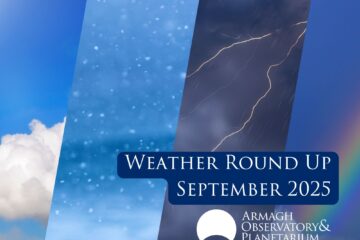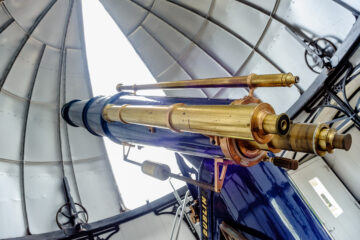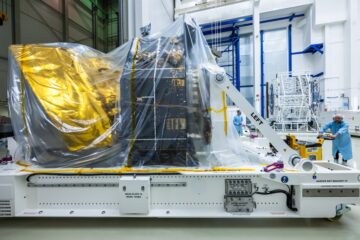Armagh Observatory, 6th October 2022: Armagh Observatory reports that September 2022 was much wetter than average, the wettest September at Armagh for 12 years. It was also warmer and sunnier than average, the sunniest September at Armagh since 1997.
Total September precipitation was 110.35 mm (4.34 inches) including 5 trace values, that is, 110.1 mm if trace values are ignored. This is approximately 60% more than the long-term (1838-2020) average September rainfall at Armagh (68.9 mm) and nearly 70% more than the most recent (1991-2020) 30-year average (65.0 mm). Despite a pleasant dry spell lasting for about a week around the middle of the month this was the wettest September at Armagh for 12 years, that is, since September 2010 (132.0 mm).
The wettest day was the 3rd with an exceptional daily total of 47.8 mm (1.88 inches). This was followed by 13.6 mm (0.5 inches) on the 11th and 9.2 mm on the 29th. The almost two inches of precipitation on the 3rd produced a new daily rainfall record for September at Armagh, namely the wettest September day at Armagh for more than 184 years, that is, since rainfall records began at Armagh in 1838. This is now also the tenth-wettest single day on record at Armagh.
It is interesting to note in this context that a squabble of 21 gulls including young was observed on the Mall during the early evening of this very wet September 3rd. Later in the month approximately 14 gulls were seen flying south in V-formation around the time of observations (09:00 GMT) on the 22nd. A sparrowhawk was seen flying close to the ground near the meteorological station around the same time on the 28th. A rainbow was also seen late afternoon (around 16:40 GMT) on the same day.
September 2022 was rather warmer than average with a mean monthly temperature of 14.2 degrees Celsius (57.6 Fahrenheit), approximately 1.7C warmer than the 225-year long-term (1796-2020) average September temperature at Armagh (12.54 C) and 0.7 C warmer than the most recent (1991-2020) 30-year September average (13.50 C). This continues a trend at Armagh in which each of the last four Septembers have been warmer than the most recent (1991-2020) 30-year September average, which itself is significantly warmer than previous 30-year September averages at Armagh, for example 12.78 C for (1961-1990), 12.85 C (1971-2000), and 13.25 C (1981-2010).
The warmest day (highest maximum air temperature) was 22.8 C (73.0 F) on the 1st followed by 21.9 C on the 10th and 21.5 C on the 8th. The coldest day (lowest maximum air temperature) was 13.8 C on the 27th followed by 14.4 C on the 25th.
The highest minimum air temperature, which usually corresponds to the warmest night, was 15.3 C on the 6th followed by 14.4 C on the 9th. The lowest minimum air temperature or coolest night was 5.0 C on the 17th, followed by 5.7 C on the 16th.
There were six ground frosts (nights with minimum grass temperatures less than or equal to zero), of which the three coldest were -1.6 C on the 17th, -1.4 C on the 24th and -1.1 C on the 18th.
In contrast to the previous year (September 2021), which was much duller than average, this September with 128.6 hours of strong sunshine was sunnier than average, supplying almost 15% more strong sunshine than the 140-year long-term (1881-2020) September average at Armagh (112 hours) and approximately 12% more than the most recent (1991-2020) 30-year average (114 hours). This was the sunniest September at Armagh for 25 years, that is, since September 1997 (138.8 hours of strong sunshine). The sunniest days, both with 11.4 hours of strong sunshine, were the 4th and 10th, followed by 10.3 hours on the 16th.
These data refer to observations at Armagh Observatory, which has been recording the weather at Armagh since 1795.
For further information, please contact:
Professor Mark E. Bailey
Emeritus Director of Armagh Observatory
Armagh Observatory and Planetarium
College Hill
Armagh
BT61 9DG
Tel: 028-3752-2928
E-mail: mark.bailey@armagh.ac.uk



0 Comments